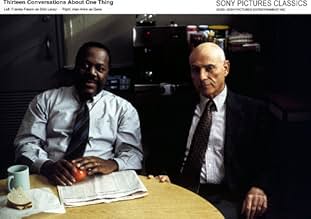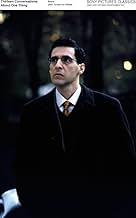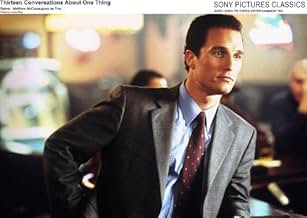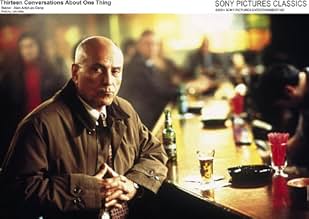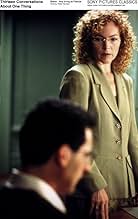Aggiungi una trama nella tua linguaIn New York City, the lives of a lawyer, an actuary, a house-cleaner, a professor and the people around them intersect as they ponder order and happiness in the face of life's cold unpredict... Leggi tuttoIn New York City, the lives of a lawyer, an actuary, a house-cleaner, a professor and the people around them intersect as they ponder order and happiness in the face of life's cold unpredictability.In New York City, the lives of a lawyer, an actuary, a house-cleaner, a professor and the people around them intersect as they ponder order and happiness in the face of life's cold unpredictability.
- Regia
- Sceneggiatura
- Star
- Premi
- 8 vittorie e 8 candidature totali
- Defendant
- (as Fernando Lopez)
- Cab Driver
- (as Allie Woods)
- Aspiring Medical Student
- (as Rob McElhenney)
Recensioni in evidenza
The film itself superficially resembles a 'Short Cuts' or 'Things You Can Tell' in that many story lines are interwoven. But the differences are profound. Altman's projects are driven by characters and situations that touch because they ramble. The 'Things You Can Tell' project is similar to this one in that its several components are all about the same idea. But 'Things' uses the device of one woman in many bodies, each with a different actress. In this project, the device is deliberate diversity of the characters, each facet having a discernible face.
I liked it. Its not highly cinematic, rather small theater. Its not the stuff that changes one's imagination. But it is literate, refined, and well woven in terms of the words.
As to the actors and their roles, one thing all these multifaceted projects have is the option for the viewer to select a backbone. As a matter of hardwiring we reflexively choose one thread as foreground and the others as background. For me, the anchor was Beatrice, which probably tells you a lot about me. The resurrection from disillusionment (with the opening of the doll's eye!) was a bit heavy so far as the character, but DuVall as an actor really impressed me. All of these actors played characters with an unrecognized inner life. Some, like Turturro work with more self-referential techniques, but with her it seemed true.
Ted's Evaluation -- 3 of 4: Worth watching.
Title (Brazil): `Treze Visões' (`Thirteen Visions')
If you haven't watched the film please stop reading.
The basic idea for the movie seems to be how interconnected we human beings are. This premise is expanded as we watch how all of the characters we see in the film, in one way, or another, share a moment in their existence where they touch each other's lives without even being aware of the fact. Ms. Sprecher weaves a fine web, as she shows the different situations in the movie.
Troy, the self-centered lawyer touches Gene's life when both are drinking, for different reasons, at the same bar. Gene is older and wiser; at the time they meet Gene is feeling sorry for himself, having being "downsized" from his job. Troy, being in high spirits, after having won a case in court, looks down to Gene, a man who he perceives as a loser. Troy's own life will go through it's own turmoil after the involuntary accident where he injures a young woman in a deserted street. Instead of helping her, he flees the scene, leaving the girl to what could be a sure death.
Gene is the center of the story in many ways. We see him as the man in charge of an insurance claims department. There is a man who works for Gene that is the epitome of good naturedness, a real kind person who is always bringing things for everyone in the office. When Gene is asked to reduce costs in his area, he fires Bowman, the man, who according to logic, must be let go first, being the last one hired. We wonder for a moment if this is just a way for Gene to get back at Bowman, because it appears this man irritates him and his coworkers. Bowman, who up to that moment has been so optimistic about things, immediately becomes a sad man.
Walker, the university professor is unhappily married to Patricia. We watch both as their marriage comes to an end. Walker is carrying on an affair with another woman from work; he ends up living alone in a small room. Not only does he lose his wife, but Helen too, the woman he was having the affair with. His life and Troy's meet, if only briefly when he buys the lawyer's car. Walker is in a way responsible for the death of one of his students who is not doing well in the Physics course.
Then there is Bea, the young woman who cleans rich people's houses. Together with Dorrie, she fantasizes what it would be like to live in one of those fabulous places. Bea, who almost died when she was a child, is not bitter about her experience. She is a kind soul who is good to everybody, no matter who. Her life and Troy's become entwined in a second without realizing, or knowing him, as his car hits her in the desolate street where she is walking to the house of one of her employers to return the shirt she has just finished resewing for him. After going to her mother's home from the hospital, we see a gradual transformation in Bea. She's still a kind person, but now she has a different attitude toward life and the bad hand she was dealt.
This film brought to mind Arthur Schnitzler's play "La Ronde" since the idea is basically the same. We humans tend to overlook the relation we have with one another, and how, in some ways, we touch the life of other people, the same way they touch ours.
The acting is first rate. Ms. Sprecher ought to be congratulated in the way she is able to present her story and get outstanding acting by all the principals and even those in small roles. Alan Arkin, as Gene, is amazing. We see in his face how everything is affecting him at all times. John Turturro gives a complex reading of this university professor. Clea DuVall brings such a luminous aura to Bea, that it's impossible not to feel bad for what has been done to her; she gives a subtle performance. Matthew McConaughey's depiction of Troy is good.
There are a lot of minor roles by actors of the stature of Shawn Elliott, Frankie Faison, Tia Texada, Rob McElhenney, Barbara Sukowa, and William Wise, who is perfect as Bowman.
Congratulations are in order to Jill Sprecher who shows a talent for directing real people in real situations. Judging by this effort, she has the potential of going far.
Lo sapevi?
- QuizThe film's story is inspired by two different head injuries that director Jill Sprecher endured.
- BlooperWalker writes the formula for acceleration incorrectly on the blackboard. It should be f/s2, where he writes (f/s)2. Then, a student says: "Don't you have to assume that the velocity is constant during the deceleration period?", and Walker partly agrees. Deceleration means that the velocity (or rather the speed) diminishes - constant velocity means there is no deceleration or acceleration. A physics teacher should never make these mistakes.
- Citazioni
Richard 'Dick' Lacey: I wish, I wish we could see into the future sometimes.
Richard 'Dick' Lacey: That's the problem, isn't it?
Richard 'Dick' Lacey: I mean, life - it only makes sense when you look at it backwards.
Richard 'Dick' Lacey: Too bad we gotta live it forwards.
- ConnessioniFeatured in Siskel & Ebert & the Movies: The Best Films of 2002 (2003)
- Colonne sonoreWohl denen die da Wandeln
Music by Heinrich Schütz (as Heinrich Schuetz)
Vocal arrangement by Richard Erickson
Sung by Holy Trinity Lutheran Church Parish Choir
I più visti
- How long is 13 Conversations About One Thing?Powered by Alexa
Dettagli
- Data di uscita
- Paese di origine
- Sito ufficiale
- Lingue
- Celebre anche come
- Tredici variazioni sul tema
- Luoghi delle riprese
- Aziende produttrici
- Vedi altri crediti dell’azienda su IMDbPro
Botteghino
- Budget
- 4.500.000 USD (previsto)
- Lordo Stati Uniti e Canada
- 3.288.164 USD
- Fine settimana di apertura Stati Uniti e Canada
- 89.499 USD
- 27 mag 2002
- Lordo in tutto il mondo
- 3.706.652 USD
- Tempo di esecuzione
- 1h 44min(104 min)
- Colore
- Mix di suoni
- Proporzioni
- 1.85 : 1








